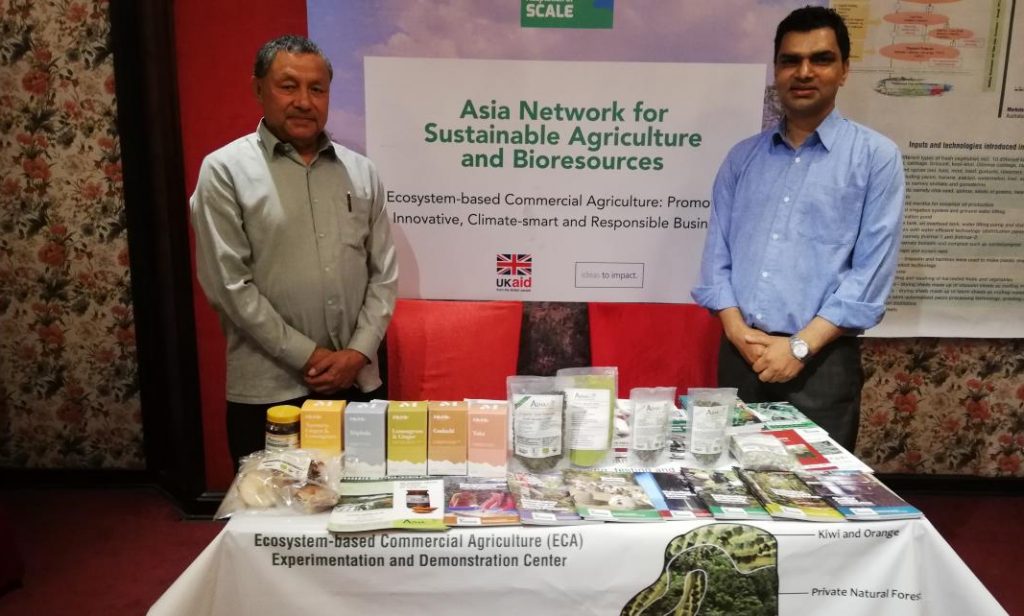TEN NEPALESE NGOS AWARDED CASH PRIZES FOR INNOVATION IN CLIMATE ADAPTATION

The winners of the Karyanwayan Prize, the last stage of the UK Aid-funded Adaptation at Scale (A@S) prize, were announced on Thursday 23 May 2019 during an award ceremony at Hotel Himalaya in Kathmandu, Nepal.
Ten non-governmental organisations (NGOs), community-based organisations (CBOs) and private sector companies were awarded a total prize purse of £500,000 for developing innovative ways to expand community-driven climate change adaptation initiatives to benefit more communities (‘scale out’) and influence local and provincial policies and programmes (‘scale up’).
Out of over 130 organisations that registered to participate in stage one and two of A@S, 27 submitted their final reports on how they were scaling their climate change adaptation initiatives to help local communities. The reports went through an online judging process, and the best 18 were shortlisted. Thereafter, they made live presentations to a panel of four experts, who have determined the final winners.
‘I was impressed by the work of the prize winners which clearly shows that, if properly motivated, our NGOs and CBOs can increase their ambition and achieve higher climate goals’, said Hon. Mr Shakti Bahadur Basnet, Nepal’s Minister of Forests and Environment, chief guest at the award ceremony. ‘This is very timely since my ministry is finalising Nepal’s national adaptation plan (NAP) and revising our nationally determined contributions (NDCs). In our fight against climate change, we need all stakeholders to develop new ways to work together’.
Winning initiatives range from new technologies and products such as riverbed water level raising and harvesting, hydraulic ram pumps and weather index insurance, to innovative business models. These include ecosystem-based commercial agriculture and innovative agroecosystem-based approaches that integrate adaptation and disaster risk reduction with inclusive forest resources management.
The winners are split across two categories, international and national NGOs and CBOs and local NGOs. Four honorary prizes were also awarded for initiatives that distinguished themselves for excellence across sustainability, technology, inclusion and governance.
The A@S prize winners
INGOs and national NGOs:
- Asia Network for Sustainable Agriculture and Bioresources (ANSAB) – 1st place, £100,000
- Ithaka Institute for Climate Farming – 2nd place, £75,000
- Shikhar Insurance Co. – 3rd place, £50,000
Local NGOs and CBOs:
- Community Development & Advocacy Forum Nepal (CDAFN) – 1st place, £100,000
- Partnership Aid Center (PACE-Nepal) – 2nd place, £ 75,000
- Sundar Nepal Sanstha (Beautiful Nepal Association) – 3rd place, £50,000
Honorary prizes:
- Teenjure Raatpokhari Community Forest User Group – £12,500, sustainability award
- Centre for Rural Technology Nepal (CRT/N) – £12,500, technology award
- Dalit Welfare Organisation (DWO) – £12,500, inclusion award
- Multipurpose Development Society (MPDS) – £12,500, governance award

The A@S prize was launched in 2015 in Nepal, which was selected due to its high vulnerability to climate change. The prize aimed to improve the ability of local communities to adapt to the impacts of climate change, with a sharp focus on the most vulnerable groups such as poor, women and Dalits, who are traditionally regarded as untouchable. The competition included a first stage, which ended in December 2016 with the award of the Protsahan Prize. This ‘encouragement prize’ was awarded to 15 organisations for their original climate change adaptation ideas. The award of the second stage, the Karyanwayan Prize, marks the end of the A@S prize competition and is the largest cash award made for climate change adaptation achievements in Nepal.
A@S is one of the innovation prize competitions run by the Ideas to Impact programme to stimulate solutions to development challenges, such as access to energy and water, through financial rewards. Ideas to Impact is funded by UK Aid delivered by the Department for International Development (DFID) and is implemented by an IMC Worldwide-led consortium which includes the Institute of Development Studies (IDS), Integrated Development Society Nepal (IDS-Nepal), Centre for Green Economic Development Nepal (CGED-Nepal), and the Southasia Institute of Advanced Studies (SIAS Nepal).
Cover photo: Representatives from ANSAB, 1st place winner of the A@S prize in the INGO and national NGO category, display their innovations at a dedicated stall at the award ceremony on 23 May 2019 in Kathmandu
Source – Ideas to Impact
